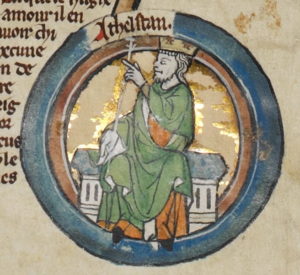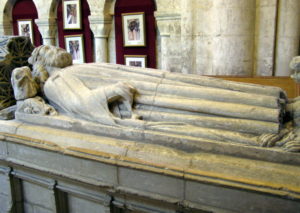King Athelstan

895 – 939
King Athelstan was the first king to rule over the entire land of England, and his reign was marked by significant accomplishments in military, political, and religious spheres. Born in 894 to Edward the Elder and his first wife Ecgwynn, Athelstan was brought up by his paternal aunt Ethelfleda after his mother’s death. He was known for his tall and handsome appearance and received education and military training in Mercia.
After Edward the Elder’s death in 924, Athelstan took control of Mercia while his half-brother Ælfweard became the king of Wessex. However, Ælfweard died just 16 days after Edward’s demise, and the people of Wessex refused to accept Athelstan as their leader. Nevertheless, Athelstan captured the entire Viking kingdom and became the first king to have the whole of England under his rule.
Athelstan’s reign was marked by several military victories, most notably at Brunanburh against a combined Scottish and Norse army in 937. He also eliminated opposition in Cornwall and made all five Welsh Kings agree to pay a huge annual tribute and established him as an indomitable force through the British Isles and on the Continent.
His household was the centre of English learning during his reign. It laid the foundation for the Benedictine monastic reform later in the century. Athelstan was known for founding churches throughout his kingdom.

Athelstan exercised great control over administration and the legal system. He followed many of his grandfather Alfred the Great’s policies to maintain law and order in his kingdom. More texts detailing the legal codes of this time have been found than that of any other 10th century ruler. His charitable nature made him popular, and he made several provisions for the poor. He established the rule that each of his manors should pay an annual fee that would be used to help the poor in the Kingdom made him a popular ruler.
As a strategy to win allies, Athelstan married off his sisters to continental rulers. He also forged unparalleled political connections across Europe and succeeded in creating the first unified kingdom of the English.
King Athelstan has sometimes been lost in the history books and taken a backseat to other significant rulers of early medieval Britain, however his kingship and influence on the Anglo-Saxons cannot be underestimated. As the first overlord king ruling over England, King Athelstan not only acquired vast territories but also centralised his power, introduced legal reform, reinforced monasticism and integrated England onto the European stage. In short, King Athelstan’s life was marked by significant accomplishments that helped shape England’s history.
King Athelstan died on 27th October 939 in Gloucester, leaving in his wake a significantly larger kingdom than the one he had inherited. He is said to be buried in or near to Malmesbury Abbey
